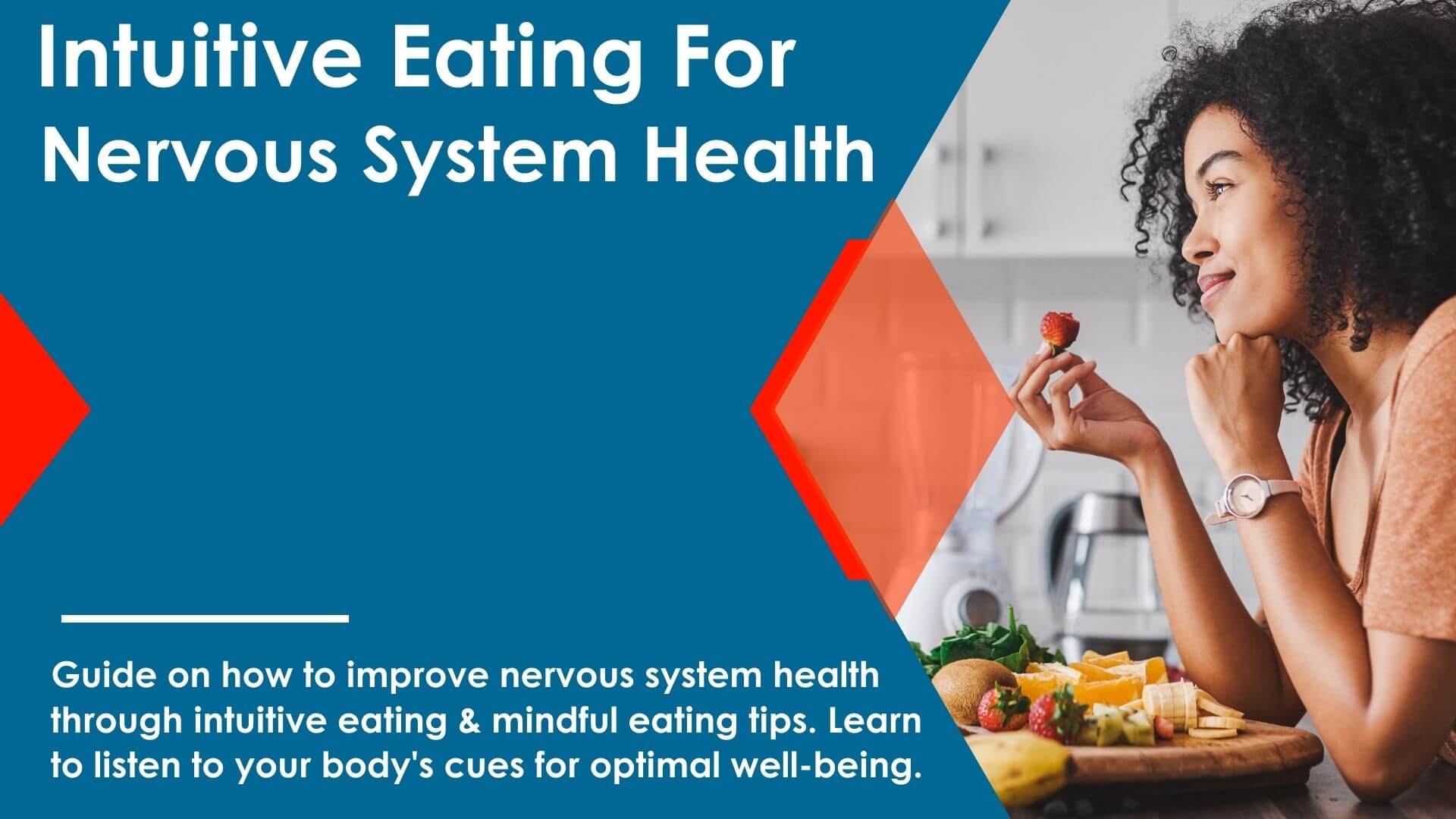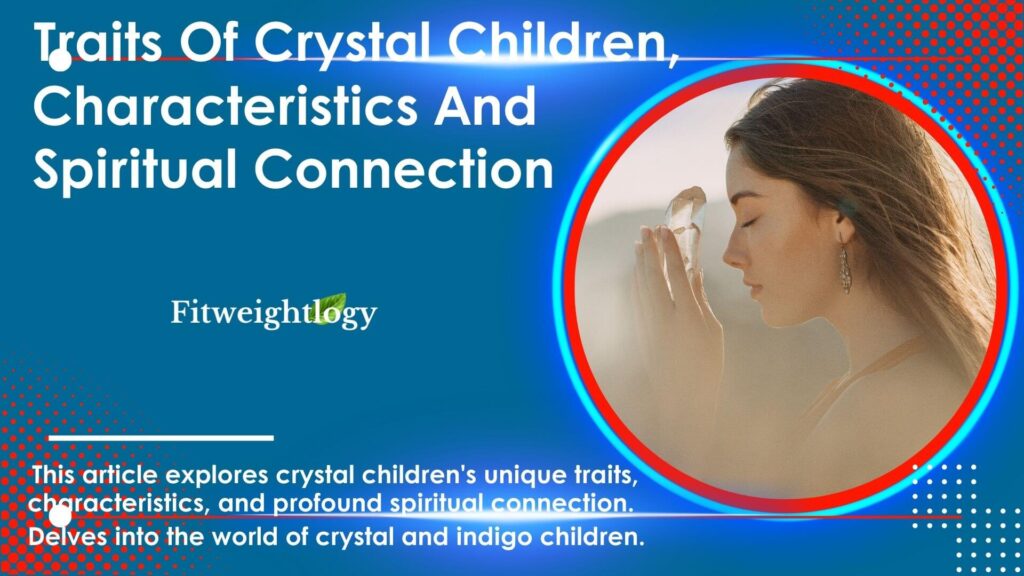Intuitive Eating For Nervous System Health – Mindful Eating
In our fast-paced society, where convenience often trumps mindfulness, we frequently rush through meals, disregarding our body’s signals. Intuitive eating, however, advocates for a shift towards reconnecting with our bodies to prioritize nervous system health.
It emphasizes tuning into hunger and fullness cues rather than adhering to rigid dietary rules. By embracing mindful eating practices, we improve overall well-being and forge a deeper connection with our bodies, acknowledging and respecting our individual health needs.
Amidst the chaos of diet culture, intuitive eating emerges as a beacon of self-care, empowering individuals to honor their bodies and cultivate sustainable habits that support long-term health and wellness.
This article delves into the profound impact of intuitive eating on nervous system health, offering practical insights to embark on this transformative journey towards a balanced and harmonious relationship with food.
What Is Intuitive Eating?

Intuitive eating is a holistic approach to nourishing your body, promoting physical and mental well-being by honoring hunger and fullness cues without judgment. It fosters self-awareness and mindful decision-making in food choices.
Tuning into your parasympathetic nervous system, known as the rest and digest state, allows for proper digestion and nutrient absorption. This mindfulness during eating cultivates a deeper connection with the nourishment process.
Unlike restrictive diets that induce guilt and deprivation, intuitive eating advocates for a balanced, flexible approach. It encourages trust in your body’s wisdom to make choices that honor individual needs and preferences. Intuitive eating fosters a positive, guilt-free relationship with food by shedding food rules.
Ultimately, intuitive eating prioritizes the pleasure and satisfaction of mindful, intuitive eating experiences. It emphasizes nourishing the body physically and emotionally without attaching moral values to food choices. Through intuitive eating, individuals can develop a sustainable, enjoyable approach to food, respecting their body’s unique needs and promoting overall well-being.
The Benefits of Intuitive Eating
Intuitive eating presents numerous benefits for physical and mental well-being, including improved food-body relationships, reduced eating-related stress, enhanced digestion, increased food freedom, and heightened fruit and vegetable intake for better overall nutrition.
Amidst a diet-obsessed culture, intuitive eating emerges as an alternative, advocating for tuning into natural hunger cues rather than strict dietary rules.
This approach alleviates stress by eliminating the constant worry associated with rigid diets, promoting a relaxed and flexible attitude towards food. Moreover, it breaks the cycle of restriction and binging, fostering moderation and freedom from feelings of deprivation.
Embracing intuitive eating challenges societal norms perpetuated by diet culture, promoting a more body-positive and inclusive environment.
In a world saturated with conflicting nutrition advice and fleeting diet trends, intuitive eating offers a sustainable and empowering path to nourishment. By trusting individual body signals and preferences, individuals can prioritize well-being while reducing stress and fostering healthier relationships with food, paving the way for a more body-positive society.

The Risks of Intuitive Eating
Intuitive eating, though widely lauded for its holistic approach to food and body acceptance, is more than just a one-size-fits-all solution. Potential risks include difficulty navigating its principles in a diet-centric culture, struggles with disordered eating or trauma, and feeling overwhelmed by hunger and fullness cues. Criticism from those unfamiliar with or unsupportive of intuitive eating can add to these challenges.
While intuitive eating advocates listening to hunger and fullness cues, rejecting dieting, and honoring cravings, it’s vital to recognize its limitations. Our bodies are complex and influenced by factors like stress and emotions, which can lead to erratic eating patterns. Disorders like binge eating disorder complicate intuitive eating further.
Moreover, intuitive eating demands a deep, mindful connection with the body, not offering quick fixes. It requires patience and realistic expectations, unlike society’s preference for instant results.
Additionally, while intuitive eating promotes food freedom, not all cravings are beneficial. Informed choices that nourish the body are vital in supporting overall well-being amidst the allure of indulgence.
The Crucial Role of Intuitive Eating in Nervous System Health
The nervous system, pivotal in regulating bodily functions like digestion and stress response, supports intuitive eating’s emphasis on mindfulness and self-awareness. In a diet-centric world, intuitive eating’s non-restrictive approach stands out, encouraging individuals to heed internal cues and honor hunger and fullness signals.
Trauma and emotional distress can complicate our relationship with food, leading to emotional eating and disconnection from our body’s cues, posing a challenge to the digestive system’s wellness. Intuitive eating offers healing through self-awareness and self-compassion, fostering a balanced food approach.
By listening to our body’s cues, intuitive eating nourishes the nervous and digestive systems, promoting well-being and reducing stress and anxiety around food. Embracing intuitive eating allows for enjoying diverse foods without guilt, facilitating relaxation and optimal nervous system function.
Integrating intuitive eating into our lives can significantly benefit nervous system health, fostering improved food relationships and reduced emotional eating. Let’s shift away from diets and restrictions, embracing intuitive eating’s power to nourish both body and mind, a valid path to health and wellness.

Practice Intuitive Eating Cultivation – Mindful eating
Mindful eating, a cornerstone of intuitive eating, involves fully immersing in the sensory experience of eating, from taste to hunger cues. Through mindful eating, individuals foster an appreciation for food, recognize hunger signals, and curb emotional eating, promoting digestion and stress reduction by activating the parasympathetic nervous system.
In a diet-obsessed society, intuitive eating’s mindful approach is crucial. By listening to internal cues, we nurture ourselves authentically, embracing interoceptive awareness and aligning with bodily needs.
Practicing intuitive eating starts with a mindful mindset: slowing down, savoring food, and attending to hunger signals for better health and wellness. Interoceptive awareness allows distinguishing between genuine hunger and emotional triggers, guiding informed food choices for a balanced relationship with eating.
Mindful eating’s impact extends to the nervous system, triggering the rest and digest mode and reducing stress. Conversely, mindless or restrictive eating activates the sympathetic nervous system, fostering anxiety and metabolic disruptions. By embracing mindful eating, individuals foster a harmonious connection with food, promoting overall well-being and resilience in a diet-centric world.

Who is intuitive eating for (and not for)?
Intuitive eating offers a transformative approach to eating and living, beneficial for those seeking to break free from chronic dieting, disordered eating, or negative body image.
However, it may not suit individuals in early eating disorder recovery, those with medical conditions requiring specific diets, or those unwilling to engage in reflective work. While intuitive eating promotes food and body acceptance, assessing its suitability for each individual is crucial.
This approach encourages releasing dieting and strict food rules, fostering a non-restrictive eating style. It empowers individuals weary of food guilt to embrace liberation. Moreover, it requires attentiveness to bodily hunger and fullness cues, necessitating trust in internal signals. Intuitive eating coaches offer valuable support in this journey, aiding skill development.
However, individuals with specific dietary needs or health conditions may not find intuitive eating suitable, requiring personalized guidance. Moreover, those grappling with emotional or stress-related eating may need additional support to address underlying issues.
Ultimately, intuitive eating fosters a balanced and sustainable approach to nourishment, albeit requiring consideration of individual circumstances. Each journey to a healthy food relationship is unique, emphasizing the importance of finding a strategy aligned with personal needs and circumstances.
Can intuitive eating fit into eating disorder recovery?
Intuitive eating proves valuable in eating disorder recovery, yet its implementation warrants caution under healthcare professional guidance. Some may require structured meal plans before fully embracing them.
Although intuitive eating, emphasizing body cues, and mindful eating to improve wellness gained popularity, its compatibility with eating disorder recovery is questioned due to the complexities involved. Individuals in recovery often grapple with distorted beliefs and emotions regarding food and body image, making intuitive eating initially overwhelming and a stressor to the process.
However, integrating elements of intuitive eating, like mindful eating, into recovery can be beneficial. Mindful eating fosters awareness and positive food experiences by focusing on tastes and sensations.
It encourages self-compassion and body acceptance, aiding in shedding restrictive behaviors and nurturing a balanced food relationship. Individuals cultivate trust in intuitive cues by honoring body needs and promoting a healthier approach to nourishment within their recovery journey.

The 10 Principles of Intuitive Eating
Evelyn Tribole and Elyse Resch introduced ten principles of intuitive eating, aiming to foster a healthier relationship with food and the body:
1. Reject the diet mentality: Release the notion that strict diets or food rules are necessary for health. Embrace the idea that all foods are permissible and should be enjoyed in moderation.
2. Honor your hunger: Recognize and respond to bodily hunger cues, granting yourself permission to eat when hungry and stop eating when full, indulging in a variety of foods for holistic health and wellness.
3. Make peace with food: intuitive eating is a non-diet approach to wellness, focusing on hunger and satiety. Grant unconditional permission to eat, eliminate guilt associated with certain foods, and acknowledge that all foods can be part of a healthy lifestyle.
4. Challenge the food police: Abstain from labeling foods as “good” or “bad,” avoid self-judgment based on food choices, and focus on nourishment and enjoyment during meals.
5. Discover satisfaction: Pay attention to the taste, texture, and satisfaction derived from food, seeking out options that genuinely satisfy and energize.
6. Respect your fullness: Listen to fullness signals, halt eating when satisfied, and learn it’s acceptable to leave food on the plate when no longer hungry.
7. Cope with emotions without using food: Find alternative methods to manage stress or emotions, engage in activities that bring joy, or seek support from loved ones.
8. Respect your body: Embrace and appreciate the body’s unique attributes, avoiding comparisons and prioritizing self-care and overall well-being.
9. Exercise – feel the difference: Engage in physical activity that is enjoyable and refreshing, shifting the focus from calorie burning to enhancing health and well-being.
10. Honor your health: Make food choices that prioritize health and taste without fixating on perfection or strict rules, allowing room for pleasure and flexibility in eating habits.
Intuitive eating promotes a non-diet approach, urging individuals to listen to internal hunger and fullness cues, fostering self-awareness and self-care over rigid regulations.
These principles guide individuals toward intuitive eating, emphasizing moderation, enjoyment, and acceptance of all foods. By following these principles, individuals can cultivate a healthier relationship with food, embracing self-compassion and well-being.

12 Reasons Intuitive Eating is Harder Than it Sounds
Intuitive eating, with its promise of liberation from restrictive diets and empowerment in our relationship with food and body image, is an enticing concept for health and wellness.
However, its practice often encounters complex challenges, particularly in a culture fixated on dieting and external beauty standards. Let’s delve deeper into each of the twelve reasons why intuitive eating can be more complex than it seems:
1. Dieting
Years of dieting can profoundly affect our relationship with food, eroding our trust in our bodies’ hunger and fullness cues. Constantly striving to adhere to rigid food rules can lead to disordered eating patterns, such as binge eating or emotional eating.
Moreover, the cycle of dieting and restriction can create a sense of deprivation and guilt around certain foods, making it challenging to cultivate a balanced and intuitive approach to eating.
2. Multitasking
In today’s fast-paced world, eating while distracted or on the go has become the norm for many. However, this habit disconnects us from the sensory experience of eating, hindering our ability to fully savor and appreciate our meals. When we eat mindlessly, we’re more likely to overeat and ignore our body’s signals of hunger and fullness, leading to an imbalance in our eating patterns.
3. Growing up around diets or food rules
Childhood experiences with diets or food restrictions can profoundly influence our beliefs and behaviors around food. Whether it’s being told to finish everything on our plate or being taught to label certain foods as “good” or “bad,” these early influences shape our relationship with food well into adulthood.
Over time, this can lead to feelings of guilt and shame around eating, making it challenging to trust our body’s signals and eat intuitively.
4. Stress or excitement can make intuitive eating harder than it sounds
Emotional states like stress or excitement can significantly impact our eating behaviors. During times of stress, our bodies release cortisol, a hormone that can increase appetite and cravings for comfort foods.
In these moments, it’s challenging to tune into our body’s hunger and fullness cues as we focus on alleviating the stress rather than listening to our bodies’ needs. Similarly, moments of excitement or celebration can lead to overindulgence and mindless eating, as we get caught up in the moment and lose sight of our intuitive eating principles.

5. Digestive Distress
Physical discomfort, such as bloating or digestive issues, can disrupt our ability to eat intuitively. When we experience digestive distress, it’s challenging to accurately perceive our body’s hunger and fullness cues.
This can lead to confusion around eating and make distinguishing between genuine hunger and discomfort difficult, further complicating our intuitive eating efforts and challenging the enteric nervous system.
6. Caffeine, alcohol, and weed
Substances like caffeine, alcohol, and weed can affect our appetite and alter our perception of hunger and fullness. While caffeine may suppress appetite, alcohol and weed can stimulate appetite and alter our sensory experiences, making it challenging to eat intuitively. These substances can disrupt our body’s natural cues, leading to confusion around hunger and fullness and potentially derailing our intuitive eating efforts.
7. Certain Medications
Some medications may suppress appetite or interfere with hunger cues, making it challenging to eat intuitively. Additionally, certain medications may alter our taste perception or cause changes in appetite, further complicating our ability to tune into our body’s signals.
It’s essential to be aware of the potential effects of medications on our eating behaviors and to seek support from healthcare professionals if needed.
8. Travel
Changes in routine or exposure to unfamiliar foods while traveling can disrupt our eating patterns and make it challenging to eat intuitively. Travel-related stress or excitement can also impact our eating behaviors, leading to overindulgence or mindless eating.
Moreover, cultural differences in food norms and availability can create additional challenges in maintaining intuitive eating practices while traveling.
9. Chronic Pain or Illness
Chronic pain or illness can significantly impact our relationship with food and eating. Pain or illness can affect our appetite and make it difficult to discern genuine hunger from discomfort, a stressor on the digestive system and overall health. Additionally, certain medical conditions may require dietary modifications that interfere with intuitive eating practices, further complicating our intuitive eating ability.
10. Bullying or body shaming when you’re young
Negative experiences with body image or bullying during childhood or adolescence can deeply affect our relationship with food and eating. These early experiences can lead to low self-esteem, body dissatisfaction, and disordered eating behaviors.
Moreover, internalizing societal beauty standards and the fear of judgment can make it challenging to trust our body’s signals and eat intuitively.

11. Food as a coping tool
Using food to cope with emotions or stress can interfere with our ability to eat intuitively. Emotional eating can create a reliance on food for comfort, making it challenging to establish a balanced relationship with food. Moreover, the cycle of emotional eating can perpetuate feelings of guilt and shame, further complicating our ability to eat intuitively.
12. Trauma
Past traumatic experiences can profoundly affect our relationship with food and eating. Trauma can disrupt our connection to our bodies, leading to difficulties recognizing hunger and satiety cues, affecting our overall wellness.
People who have experienced trauma may use food as a coping mechanism to numb emotional pain or regain a sense of control, further complicating their ability to eat intuitively.
Navigating these challenges requires patience, self-compassion, and a commitment to healing our relationship with food and body image. It’s essential to seek support from healthcare professionals, therapists, or registered dietitians specializing in intuitive eating and trauma-informed care.
By addressing these obstacles and working towards healing, we can cultivate a more intuitive and nourishing approach to eating that honors our body’s needs and promotes overall well-being.
Final Thoughts On Intuitive Eating For Nervous System Health
In conclusion, intuitive eating presents a holistic approach to nurturing our bodies and fostering nervous system health. By heeding our body’s cues and practicing mindful eating, we encourage a positive relationship with food and enhance overall well-being.
However, embracing intuitive eating requires patience, time, and possibly professional guidance from a registered dietitian or therapist. It’s a journey of self-discovery, self-trust, and embracing the joy of nourishing our bodies. While not a quick fix, intuitive eating offers sustainable behavior change and a shift away from diet culture.
Ultimately, it empowers us to honor our body’s wisdom, fostering resilience and holistic health. As you embark on this journey, remember to be kind to yourself, celebrate progress, and prioritize your well-being. Intuitive eating is a powerful tool for nurturing, respecting, and loving our bodies, offering a pathway to long-term health and vitality.
Posted in
Welcome to Fitweightlogy! We are an optimum review website of all the best products associated with weight loss, healthy life, fitness, tips, and motivations. We are a quickly developing organisation given that we typically put our visitors first. A customer-focused experience has regularly been our objective, and we value our comprehensive policies, which have placed us in a domain well beyond our competitors. On this website, we assist our visitors in reaching their desired weight, appearance goals and live a healthy lifestyle, as well as save money and time by meticulously researching and evaluating the market, assessing the available products, and producing informative recommendations based on factors such as quality, availability, price and more. Furthermore, our passion is to assist you in choosing the best possible product through our product reviews.








